- Home
- Peter Lerangis
Lab 6 Page 6
Lab 6 Read online
Page 6
It was cold. And smooth.
Silky smooth.
Sam pulled his arm back.
“Sam, what is going on?” Jamie asked. “Is he alive?”
“No,” Sam said.
“HE’S DEAD?”
“No.”
“WELL, THEN WHAT IS HE?”
Sam placed his hand on the cheek again. He scratched the skin with his fingernail. Deep.
It ripped cleanly. No blood.
BEEEEP-BEEEEP-BEEEEP!
On one of the rolling tables a monitor blinked with the words INITIATE EPITHELIAL SEALANT.
Epithelial — that was one of the words he’d seen on his dad’s computer. Sam knew that word. From biology.
It meant of or relating to the upper layer of skin. Something like that.
The cheek was epithelial, all right. It was just like skin. But it wasn’t skin. It was synthetic. It needed “sealant.”
“He’s … not a he,” Sam said.
“What does THAT mean?”
“He’s an it …”
“Sam, this is too weird. We don’t belong here, Sam — ”
“He’s — ”
Kevin.
No. Not Kevin. How could this be Kevin? This was just a copy. A humanoid. A model of how Kevin would have looked had he lived.
Another of Mom and Dad’s secret projects.
A lifelike reconstruction of someone that never existed.
The kid I “absorbed.”
Why? What was the point?
To admire him? To pretend he was alive? To dream about what might have been?
It was sad.
It was sick.
Sam heard a new commotion. Above them. He instinctively looked up, but his head hurt too much.
The lights around him flashed and blurred. A thousand instruments, all waiting for something.
And then it hit him.
It suddenly made sense.
The body needs a brain.
The brain needs a soul.
The body is on the table.
The soul is in me. Crowding me.
But I can pass it on.
Into the transpatheter.
Which loads it into the brain.
And then —
KEVIN.
“No!” Sam cried out, clutching his head.
The voice was back. The feeling was back.
But — how — ?
“SAM!”
Jamie reached out to help him. Something was happening but Sam couldn’t focus, couldn’t pay attention, couldn’t move.
Sam sank to his knees. The other voice inside him was louder and more agitated than before (WHY ARE YOU DOING THIS TO ME? THIS WILL KILL YOU) — and Sam didn’t know what it meant so he tried to talk to it mentally (Who are you? Are you Kevin?) but the voice was growing louder, deafening, stretching Sam’s mind until he thought his head was about to blow apart. (IT’S NOT GOING TO WORK! ITS NOT MEANT TO BE!)
“What?” Sam said aloud, his voice strangled and weak. “WHAT’S not going to work?”
“Sam!” Jamie was pulling him up now. “They’re coming!”
They?
Who?
“HELLLP … ME!” The words came out of Sam’s mouth — but they weren’t from him. The other voice — the other person — was speaking through Sam now.
“What do you want?” Sam answered.
Jamie thought he was talking to her. “To get you out of here!”
“YES … GET ME … OUT OF HERE!” cried the voice.
“I’m trying to!” Jamie urged. “Come on!”
“Why are you back, Kevin?” Sam pleaded. “I thought I lost you in the transpatheter!”
Jamie looked at him, horrified. “Sam, who are you talking to?”
She loosened her grip. Sam fell back.
His head hit the floor.
“Let me go,” the voice spoke through Sam, softer now. Reassuring. “You’ll be all right.”
Jamie was still pulling at him. “I can’t let you go, Sam.”
“Let me go.”
Yes.
Do it, Sam.
Have some peace.
Finally.
But how?
What was Kevin asking? Was he asking to die?
How do I do it?
How does one person die inside another?
As Sam’s eyes closed, he realized.
He knew.
He had taken Kevin’s life.
Now Kevin was getting revenge.
Absorbing him back.
A life for a life.
Jamie yelled.
The wall swung open.
But Sam didn’t hear either sound.
CHANGE OF WATCHER STATUS
Completion: Unknown
16
WHEN THE EXPLOSION HAPPENED, Sam was rising.
The light above him was pure, cold, and white.
Into the light.
Death. The way people describe it.
A scream resounded in the room, blotting out all sound. It was his own voice — but he was outside it somehow, listening. Floating in the light. Hovering. Bodiless. Sightless.
He was pure energy now.
And he knew what had happened, even though he couldn’t see it.
His brain had split.
But there were no pieces. No grisly aftermath.
It had divided like a cell.
Two minds. Equal, whole, and separate.
Kevin’s voice was fading away. But it no longer pleaded. Instead, it babbled on about nonsense — superstrings and parallel this-and-that, the same words over and over, like a chant.
Sam was aware of time passing — a great deal of time. But the length was meaningless. An hour in a nanosecond. He heard other voices around him, too, not just Kevin’s. Frantic and familiar. Mom. Dad. Jamie.
Where are they?
He wanted to see them. More than anything else.
He struggled to see.
Eyes — I must have eyes.
And the pain surged back in.
Unspeakable pain that went beyond screaming, that exhausted more than hurt.
He realized he was no longer floating.
He was lying on his back, and he could feel again.
His head was covered. It prickled, warm and uncomfortable. His joints were stiff, as if he’d been asleep for days. And his cheek hurt.
As he opened his eyes, the images around him seemed blotchy and pixilated, the colors too bright and harsh.
His mom and dad drew closer around him.
“Mm … daaaa.” His tongue felt thick, his jaw stiff.
Now Jamie came into sight. Her eyes were wide as softballs, her mouth open in shock.
What? What’s happened to me?
He tried to sit but his arms and legs were tied down. He realized he was wearing the transpatheter helmet.
All he could move was his head.
Craning his neck, he saw the body lying on the table next to him. It, too, was wearing a transpatheter helmet.
Kevin.
I was right. They must have “activated” the body. Transferred Kevin out of me and into it.
“Ihwwooo.”
Mom’s face was streaked with tears. “What’s he saying?”
Sam struggled to repeat himself, moving his mouth slowly like an infant learning to speak for the first time. “It … wworrrked. The brrrraaain … innn Laab Six — ”
“Yes, Sam, it worked,” Mr. Hughes said.
“Yyyou put it… innnto the bo-o-ody,” Sam said. “Ssssu-u-urgicalllly. While I wa-a-as ssssleeping.”
“Yes,” Mrs. Hughes replied.
“Bu-u-ut it isn’t a brrrain, is it?”
Mrs. Hughes shook her head. “Not without the transpatheter.”
“The three had to work together—the body, the brain, the transpatheter. We weren’t expecting to have to do it so soon. We thought, maybe another month …”
It was all becoming clear now.
I absorbed him, all right. And he s
tayed with me.
His essence.
He grew as I grew — hidden away in some corner of my brain, some part of the unused eighty-five percent.
But he awakened whenever I was near Turing-Douglas.
Whenever I was near the transpatheter.
That was his escape. He could sense it. The way a dog becomes agitated when he knows a visitor’s near.
That was why he took over my dreams — Dad had brought a transpatheter into the house. Kevin was sending me hints. Warning me not to do this.
But why?
Sam knew he wouldn’t have all the answers for a long time.
But he felt grateful.
They’ve completed the task. So he’s been transferred. Into the —
The —
Something was wrong.
Way wrong.
Everyone had turned to the android.
It was sitting up.
Sam’s vision was still blotchy. But he could see that the android was wearing the clothes he’d been wearing. And the table it was lying on was brown, not black.
It was the table that had been out in the hall.
On its hand, a bright red scab had formed.
“I did it,” it said.
“Yes, Sam,” Jamie told it. “You did it.” No.
NO!
Sam swung his forearm up to feel his face.
The cut on his cheek was clean and bloodless.
WATCHERS
Case File: 7222
Name: Samuel Hughes
Age: 13
First contact: 41.33.02
Acceptance: Suspended
A Biography of Peter Lerangis
Peter Lerangis (b. 1955) is a bestselling author of young adult fiction; his novels have sold more than four million copies worldwide. Born in Brooklyn, New York, Lerangis began writing in elementary school, inventing stories during math class—after finishing the problems, he claims. His first piece of published writing was an anonymous humor article for the April Fools’ Day edition of his high school newspaper. Seeing the other students laughing in the corridors as they read it, planted the idea in his head that he could be a writer. After high school he attended Harvard University, where he majored in biochemistry and sang in an a cappella group, the Harvard Krokodiloes. Intending to go on to law school, Lerangis took a job as a paralegal post-graduation. But after a summer job as a singing waiter, he changed his path and became a musical theater actor.
Lerangis found theatrical work on Broadway, appearing in They’re Playing Our Song, and he toured the country in such shows as Cabaret, West Side Story, and Fiddler on the Roof, acting alongside theatrical greats such as Jack Lemmon, John Lithgow, Jane Powell, John Raitt, and Victor Garber. During these years, Lerangis met his future wife, Tina deVaron, and began editing fiction, a job that would eventually lead him to writing novels of his own.
Lerangis got his start writing novelizations under the penname A. L. Singer, as well as installments of long-running series, such as the Hardy Boys and the Baby-sitters Club. He eventually began writing under his own name with 1994’s The Yearbook and Driver’s Dead, two high-school horror novels that are part of the Point Horror series of young-adult thrillers.
In 1998, Lerangis debuted Watchers, a six-novel sci-fi series, which won Children’s Choice and Quick Picks for Reluctant Readers awards. The first book in the Abracadabra series, Poof! Rabbits Everywhere (2002), introduced Max, an aspiring magician who struggles to keep a lid on the supernatural happenings at his school. Lerangis followed that eight-book series with the immensely popular Spy X novels, about a pair of twins drawn into international espionage.
The stand-alone novel Smiler’s Bones (2005), based on the true story of an Eskimo brought to New York City in 1897, won critical acclaim and a number of awards. Most recently, Lerangis has collaborated with a group of high-profile children’s authors on Scholastic’s the 39 Clues, a sprawling ten-novel adventure series.
At times, Lerangis’s life has been as thrilling as one of his stories. He has run a marathon, rock-climbed during an earthquake, gone on-stage as a last-minute replacement for Broadway legend Alan Jay Lerner, and visited Russia as part of a literary delegation that included First Lady Laura Bush. He lives with his family in New York City, not far from Central Park.
In an apartment in Brooklyn, shortly after giving birth, Mary Lerangis urges her first-born son to become a writer.
In Prospect Park, Nicholas Lerangis entertains a son so obsessed with books that, by sixteen months, he had yet to learn to walk.
Lerangis, stylish even at four years old.
Lerangis (in back) with his younger sister and brother. He promised them that if they learned to play well enough, the little man on the piano would start to dance. . . . They are still practicing.
To this day, Lerangis refuses to admit that this early work was created during sixth-grade math class.
Lerangis as a freshman at Freeport High School in 1970. Here, he shows off his writing style and his mustache, both of which were to develop quite a bit in the future.
Lerangis (standing, second from left) at the Charles River with his a cappella singing group, the Harvard Krokodiloes. The group still performs to this day.
Lerangis promptly retired his ruffled shirt after this performance at Harvard University’s Sanders Theater in 1976.
Lerangis with his soon-to-be wife, Tina deVaron, at their rehearsal dinner in Boston in 1983.
Lerangis with his sons, Nick and Joseph, in 1991. He remarks that, although this was a comfortable pose at the time, any attempt to recreate it today would be painful.
In 2003, Lerangis was invited by the White House to accompany First Lady Laura Bush to Moscow to represent the United States at the first Russian Book Festival. From left to right: R. L. Stine, Lerangis, Marc Brown, Cherie Blair QC, and First Lady Laura Bush.
The Lerangis/deVaron family in 2005 at the Gates exhibition in Central Park— just a hop, skip, and a jump from their home on the Upper West Side. (Image courtesy of Ellen Dubin Photography.)
A welcome reception during an author visit in Solana Beach, California, in 2009.
Lerangis connects with his audience after a school visit in Chappaqua, New York, in 2012.
All rights reserved under International and Pan-American Copyright Conventions. By payment of the required fees, you have been granted the non-exclusive, non-transferable right to access and read the text of this ebook onscreen. No part of this text may be reproduced, transmitted, downloaded, decompiled, reverse engineered, or stored in or introduced into any information storage and retrieval system, in any form or by any means, whether electronic or mechanical, now known or hereinafter invented, without the express written permission of the publisher.
This is a work of fiction. Names, characters, places, and incidents either are the product of the author’s imagination or are used fictitiously. Any resemblance to actual persons, living or dead, businesses, companies, events, or locales is entirely coincidental.
copyright © 1999 by Peter Lerangis
cover design by Angela Goddard
978-1-4532-4825-6
This edition published in 2012 by Open Road Integrated Media
180 Varick Street
New York, NY 10014
www.openroadmedia.com
EBOOKS BY PETER LERANGIS
FROM OPEN ROAD MEDIA
Available wherever ebooks are sold
FIND OUT MORE AT WWW.OPENROADMEDIA.COM
follow us: @openroadmedia and Facebook.com/OpenRoadMedia
Videos, Archival Documents, and New Releases
Sign up for the Open Road Media newsletter and get news delivered straight to your inbox.
FOLLOW US:
@openroadmedia and
Facebook.com/OpenRoadMedia
SIGN UP NOW at
www.openroadmedia.com/newsletters

 The Orphan
The Orphan Lost in Babylon
Lost in Babylon Last Stop
Last Stop Antarctica Escape from Disaster
Antarctica Escape from Disaster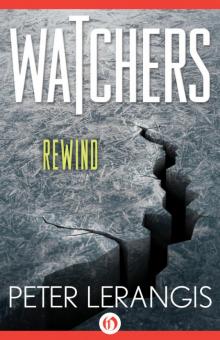 Rewind
Rewind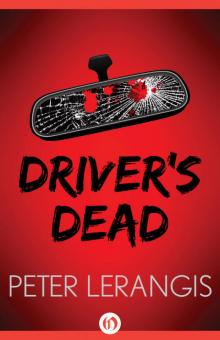 Driver's Dead
Driver's Dead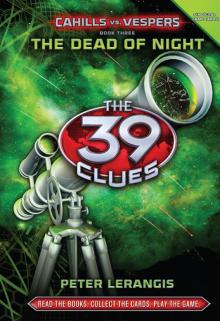 The Dead of Night
The Dead of Night The Promise
The Promise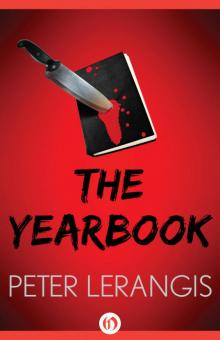 The Yearbook
The Yearbook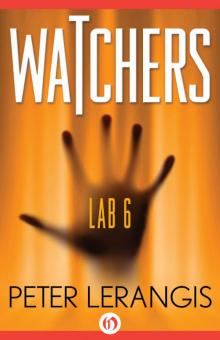 Lab 6
Lab 6 The Tomb of Shadows
The Tomb of Shadows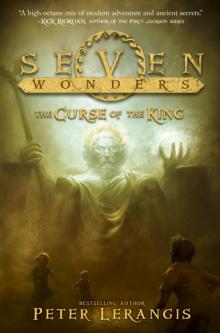 The Curse of the King
The Curse of the King Max Tilt: Fire the Depths
Max Tilt: Fire the Depths The Fall Musical
The Fall Musical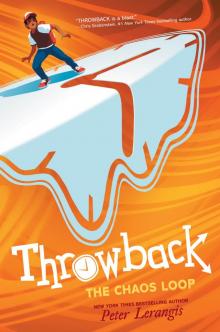 The Chaos Loop
The Chaos Loop Island
Island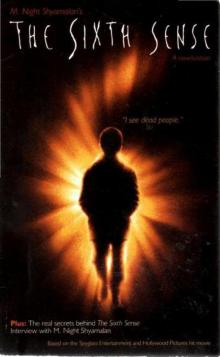 The Sixth Sense
The Sixth Sense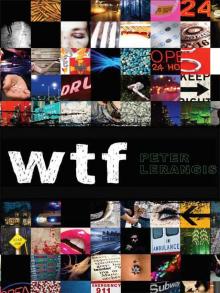 Wtf
Wtf War
War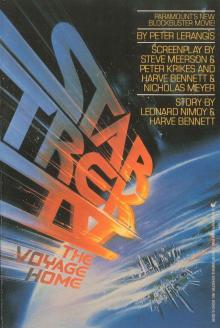 Star Trek IV, the Voyage Home
Star Trek IV, the Voyage Home The Sword Thief
The Sword Thief The Viper's Nest
The Viper's Nest The Select
The Select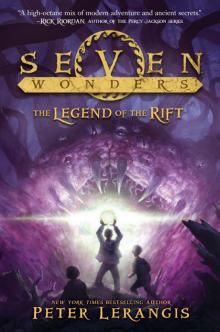 The Legend of the Rift
The Legend of the Rift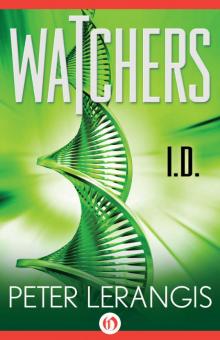 I.D.
I.D. The Sword Thief - 39 Clues 03
The Sword Thief - 39 Clues 03 The 39 Clues Book 7: The Viper's Nest
The 39 Clues Book 7: The Viper's Nest Antarctica
Antarctica Seven Wonders Journals: The Select
Seven Wonders Journals: The Select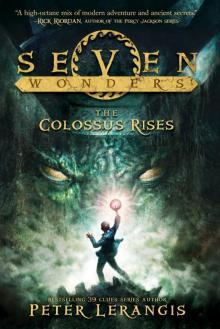 Seven Wonders Book 1: The Colossus Rises
Seven Wonders Book 1: The Colossus Rises Enter the Core
Enter the Core![39 Clues _ Cahills vs. Vespers [03] The Dead of Night Read online](http://i1.bookreadfree.com/i1/04/02/39_clues_cahills_vs_vespers_03_the_dead_of_night_preview.jpg) 39 Clues _ Cahills vs. Vespers [03] The Dead of Night
39 Clues _ Cahills vs. Vespers [03] The Dead of Night Fire the Depths
Fire the Depths 80 Days or Die
80 Days or Die Seven Wonders Book 3
Seven Wonders Book 3